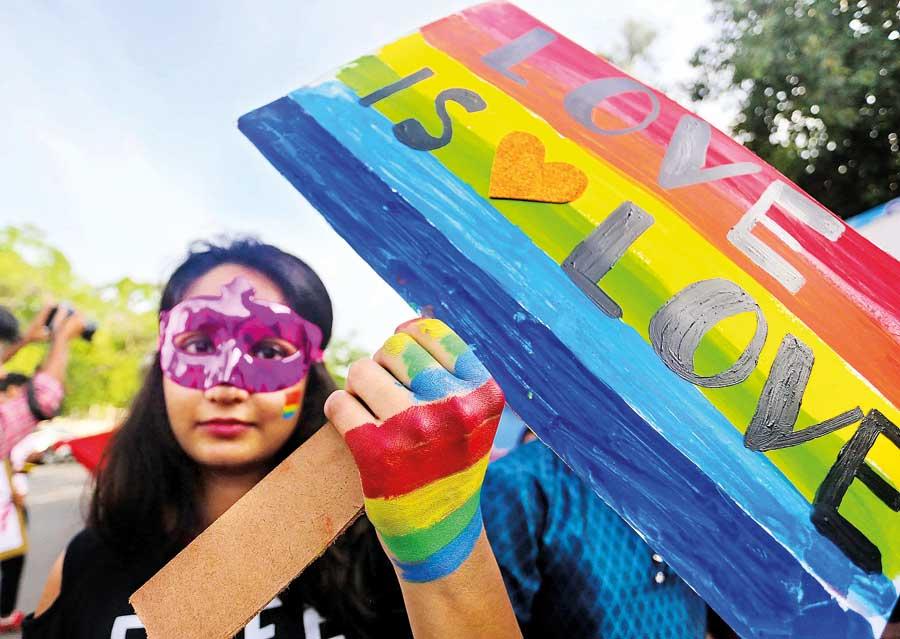01 Mar 2023 - {{hitsCtrl.values.hits}}

An Indian supporter of the LGBTIQ community takes part in a pride parade (AFP)
“Decriminalisation is an extremely important and long overdue step. It will show that the law, rightfully, does not view same-sex relationships as an offence, a wrong or something that requires state interference or punishment,” said Ambika Satkunanathan, human rights lawyer, activist and former Commissioner of the Human Rights Commission of Sri Lanka.
requires state interference or punishment,” said Ambika Satkunanathan, human rights lawyer, activist and former Commissioner of the Human Rights Commission of Sri Lanka.
In August 2022, a Private Members’ Bill was initiated by MP Premnath C. Dolawatte and the Sri Lanka Podujana Peramuna (SLPP) calling for the decriminalisation of homosexuality and the amendment of Sections 365 and 365A of the Penal Code. The President announced that the government would not take action to block the Bill shortly after it was presented. The ruling party as well as several other parties have since stated their support for the Bill’s passing. The draft Bill has been referred to the Attorney General’s Department to assess its alignment with the Sri Lankan Constitution.
If the Bill passes, Sri Lanka would become the 30th Asian country to decriminalise homosexuality. Same-sex marriages, however, would not be legalised.
The decriminalisation of same-sex relationships would play an integral role in reducing discrimination against members of the LGBTIQ (Lesbian, Gay, Bisexual, Transgender, Intersex, Questioning/Queer) community, and has been a focal aim of activists.
“For a very long time, we have tried many avenues through which to convince the government to decriminalise consenting same-sex relationships. It’s a wait-and-see game because we know what has happened in the past. Hopefully, the people in power have learned from their mistakes, opened their eyes and become less discriminatory. There’s a lot of hope,” shared Rosanna Flamer-Caldera, LGBTIQ rights activist and Founder of Equal Ground.
The Bill: far from perfect
Dolawatte’s Private Member Bill has sparked progressive conversation within many political parties as well as amongst the public. However, an important detail of this Bill is that it seeks to amend sections 365 and 365A, rather than repeal them.
The proposed amendment to section 365 retains the criminalisation of carnal intercourse with animals. It can be noted that this is already covered in Section 2(1) of the Prevention of Cruelty To Animals Act.
The Bill seeks to amend section 365A to criminalise gross acts of indecency committed in certain contexts, specifically:
This proposed amendment carries an overlap with sections 363 and 364 of the Penal Code as well as the Prevention of Torture Act and laws on abuse.
Satkunanathan commented, “There is no rationale for not repealing sections 365 and 365A and then amending provisions in the laws that are criticized for being gender specific to be gender neutral. Continued retention of sections 365 and 365A after amendment makes them redundant because they will then cover areas that are already dealt with by existing law”.
Flamer-Caldera expressed the same concern. “I don’t see why they can’t take off 365 and 365A completely and just decriminalise the same. We don’t know how the government is going to tweak these laws. We’re concerned. I’m concerned,” she remarked.
The decriminalisation of homosexuality does have the power to change how the police and various state actors treat LGBTIQ individuals as well as open the door towards achieving positive social change
The current reality
“The LGBTIQ community is currently marginalised in all social services, unless you don’t say you are gay or lesbian or part of the community and are able to ‘pass’. We don’t want to ‘pass’ in order to be treated as full citizens,” shared Flamer-Caldera.
This marginalisation has resulted in the inequitable treatment of LGBTIQ individuals, thus limiting their access to healthcare, justice and fair consideration in the workplace. Children are bullied and treated differently by teachers. Slurs are yelled out in public and arbitrary arrests are made. The decriminalisation of homosexuality does, therefore, have the power to change how the police and various state actors treat LGBTIQ individuals as well as open the door towards achieving positive social change.
“We are a very puritanical and conservative society as well as a hypocritical society. For example, people don’t want sex-ed taught in schools. Teaching sex-ed does not corrupt children, it makes them more aware. It makes them safer by giving them the knowledge to protect themselves. This is important so that they do not grow up with sexist, misogynistic values. It is this lack of awareness and understanding that creates environments which enable violence against women and LGBTIQ persons” said Satkunanathan.
She further commented, “We have a Member of Parliament using abusive, sexist language against a woman Parliamentarian, and that apparently is okay but teaching children about their bodies and their sexuality is not. This denial and hypocrisy is harming us”.
Creating a culture of acceptance
There is still a huge stigma and a sense of propagated shame surrounding the LGBTIQ community in Sri Lanka which has resulted in them being mistreated and discriminated against.
|
Rosanna Flamer-Caldera |
|
Ambika Satkunanathan |
Legislative change must, therefore, be compounded with social change in order to advance the acceptance and safety of these individuals.
Little by little, this change is taking place.
Flamer-Caldera stated, “Equal Ground has done programmes in 20 out of the 25 districts and we have never once faced any kind of hatred from people. They have understood and opened their minds, once they realised what the subject is and why people are different. When people are educated, they think in a totally different fashion. One would think that people in the rural areas would be more homophobic and uptight but they accepted us and were able to converse with us and ask questions to better understand what the LGBTIQ community really is”.
“Since 2015, we have been doing diversity and inclusion programmes in many corporations. We’re seeing these efforts beginning to bear fruit. Many corporations are supporting LGBTIQ rights and sponsoring LGBTIQ groups as well as joining us for Colombo Pride. The culture is changing,” she added.
Satkunanathan echoed the need for more social awareness and education, emphasising the role of the state, political parties and schools. “Our school curriculum is quite sexist, there are elements in it which are prejudicial to certain communities. It does not contain progressive values that can contribute towards creating an equitable society in which there is social cohesion and harmony. This needs to change,” she said.
What next?
While decriminalising homosexuality would be a notable advancement in terms of state recognition of the gay and lesbian community, it is still a small step in the long-drawn road to equality.
During this interim period before the Bill progresses through the lawmaking levels, it is important to question what else can be done to promote equality.
“We don’t need to wait for decriminalisation to change our textbooks, but one of the most difficult things to do is to change our educational curriculum. We don’t need to wait for decriminalisation for political parties to change their behaviour. We don’t need to wait for decriminalisation to create awareness or for state sector staff, such as those in health care, to treat LGBTIQ persons with respect and dignity”, Satkunanathan pointed out.
06 May 2024 1 hours ago
06 May 2024 1 hours ago
06 May 2024 2 hours ago
06 May 2024 3 hours ago
06 May 2024 3 hours ago